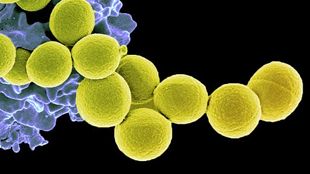 MRSAFLICKR, NIAIDBacterial antibiotic resistance is widespread and presents ongoing challenges in treating infections. A less widely known—but equally challenging—problem is antibiotic tolerance, where bacteria called persisters are not sensitive to antibiotics because the drugs’ targets are inactive in these dormant cells. Kim Lewis’s group at Northeastern University in Boston, Massachusetts, had previously shown that persisters give biofilms their drug-tolerant properties. Now, Lewis and his colleagues have eradicated a biofilm infection with a derivative of the drug acyldepsipeptide called ADEP4, and showed that it activates a protease in persister cells, causing them to self-digest. Their work was published in Nature today (November 13).
MRSAFLICKR, NIAIDBacterial antibiotic resistance is widespread and presents ongoing challenges in treating infections. A less widely known—but equally challenging—problem is antibiotic tolerance, where bacteria called persisters are not sensitive to antibiotics because the drugs’ targets are inactive in these dormant cells. Kim Lewis’s group at Northeastern University in Boston, Massachusetts, had previously shown that persisters give biofilms their drug-tolerant properties. Now, Lewis and his colleagues have eradicated a biofilm infection with a derivative of the drug acyldepsipeptide called ADEP4, and showed that it activates a protease in persister cells, causing them to self-digest. Their work was published in Nature today (November 13).
“From a treatment perspective or a translational research perspective, [this study is] probably one of the most profoundly important advances that I’ve seen in the field for more than a decade,” said Garth Ehrlich, who is a professor of microbiology and immunology at the Drexel University College of Medicine in Pennsylvania, and was not involved in the work. “This is really transformative,” he continued. “The fact that they were actually able to eradicate a biofilm infection in deep tissue is essentially unheard of.”
Based on previous work in actively dividing cells, Lewis’s team predicted that ADEP4 would activate ClpP—a protease that typically identifies and degrades misfolded proteins—in dormant persisters, too. The researchers showed that in a stationary population of methicillin-resistant Staphylococcus aureus (MRSA), treatment with ...





















